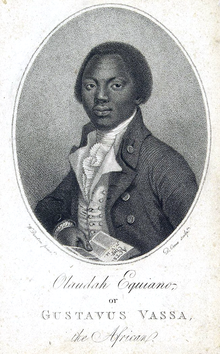Olaudah Equiano
Olaudah Equiano (alias Gustavo Vassa) (* 1745 in Igbo , in today's Nigeria , † March 31, 1797 in Middlesex ) was a former slave , a fighter for the ban on the slave trade and the author of a very famous autobiography at the time .
biography
As a 10-year-old boy, Equiano was caught by slave hunters, transported to the coast and sold there to slave traders. He survived a gruesome crossing " (middle passage) " and landed on the West Indian island of Barbados . The boy went from hand to hand and after a short time came to Virginia to a plantation owner , who in turn sold him to an English naval officer named Henry Pascal. As a personal servant, he took part in the Seven Years War in America from 1757 to 1762 . In 1762 it was sold to a plantation owner and came back to the West Indies. Here he could buy himself out (redemption) , but stayed with his master, the Quaker Robert King. From 1767 to 1773 he worked on various merchant ships and made trips to the Mediterranean and the West Indies. In 1773 he took part in a research trip to the Arctic . Convinced of the Christian idea, he became a Methodist .
From 1775 to 1776 he helped his friend and former employer Dr. Charles Irving setting up a plantation in Central America . It was here that he realized that the slave-keeping system could not be improved, and he became an active campaigner for a ban on human trafficking , which it was hoped would cause the system to disappear over time. Back in England in 1777, he joined the abolitionist movement around Granville Sharp . He focused his work on three areas:
- a project for the return of slaves to Africa ( Sierra Leone ).
- Struggle in the movement to abolish the slave trade ( abolition ) .
- his autobiography.
He married an English woman, had two daughters, whom he raised himself after the death of his wife, he led a middle-class existence and left his daughters a considerable fortune.
The life story of Equiano, as portrayed in his autobiography, has been extensively examined and questioned by Vincent Carretta. However, only his African origin was questioned. Vincent Carretta accused him of having invented his origins (being born in Africa) and his survival during the crossing, not only to sell more books, but also to fuel the movement against the slave trade.
Works
- The Interesting Narrative of the Life of Olaudah Equiano or Gustavus Vassa the African, written by himself. 9th edition. Self-published, London 1794, OCLC 470255901 .
Modern edition:
- The Interesting Narrative and Other Writings . Edited with an Introduction and Notes by Vincent Carretta. Penguin Books, New York 1995, ISBN 0-14-043485-2 .
Published in German:
- Strange life story of the slave Olaudah Equiano, published by himself in 1789. Insel Verlag, Frankfurt am Main 1990, ISBN 3-458-16073-6 .
Secondary literature
- Vincent Carretta: Equiano the African: Biography of a Self-Made Man. University of Georgia Press, Athens 2005, ISBN 0-8203-2571-6 .
Individual evidence
- ↑ Olaudah Equiano - BBC History (English)
Web links
- Literature by and about Olaudah Equiano in the catalog of the German National Library
- Olaudah Equiano, or, Gustavus Vassa, the African on brycchancarey.com
| personal data | |
|---|---|
| SURNAME | Equiano, Olaudah |
| ALTERNATIVE NAMES | Vassa, Gustavo |
| BRIEF DESCRIPTION | Nigerian slave and writer |
| DATE OF BIRTH | 1745 |
| PLACE OF BIRTH | Igbo , now Nigeria |
| DATE OF DEATH | March 31, 1797 |
| Place of death | Middlesex |

